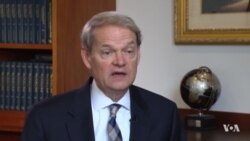President Donald Trump's approval rating has headed into unfamiliar territory in recent weeks — upward.
Trump's approval hit 43 percent in the latest NBC News/Wall Street Journal poll, with 52 percent disapproving. That represents a 3 percent improvement from last month in the same survey.
Several other new surveys also show Trump at or slightly above 40 percent. The RealClearPolitics polling average puts the president's approval rating at 41 percent, a noticeable bump from August, when the rating was often in the mid-30s. For much of the second half of August, Trump's approval rating in the Gallup Daily Tracking poll was either 34 percent or 35 percent, historically a low mark for a new president. On Thursday, Gallup had Trump at 37 percent. The previous day, Trump hit 39 percent, his highest mark since late July.
WATCH: Trump's Poll Numbers Improving After Outreach to Democrats
Bipartisan appeal
Trump's recent outreach to Democrats on budget issues and, possibly, immigration has boosted his poll numbers, as has his administration's response to Hurricanes Harvey and Irma. The NBC/Wall Street Journal poll found that 71 percent of those surveyed approved of Trump's deal with Democrats to fund the government until December and raise the debt ceiling, while 8 percent disapproved.
The question is whether Trump has turned a political corner, or is merely seeing a temporary respite from the low poll ratings that have plagued him since the beginning of his presidency.
That could depend on whether working with Democrats is a long-range goal or a passing fad, and experts said that making a forecast on that could turn out to be foolish.
"When it comes to President Trump, I have gotten out of the prediction business," said Brookings Institution scholar Bill Galston. "For now, this is a significant shift of strategy and tactics. There is no way of knowing whether it will last."
WATCH: Approval Ratings: A Powerful Measure of the Public's View of Their President
Partisan approach on health care
It looks as though bipartisan cooperation will not extend to health care, where Senate Republicans are making one last attempt to replace Obamacare. The effort is being led by Louisiana Senator Bill Cassidy and South Carolina's Lindsey Graham.
"I do not want to go back to South Carolina and say that I did everything I could to repeal Obamacare and not believe it in my heart," Graham told reporters.
Trump has been critical of Senate Republicans for their past failure to pass a bill, but sounded optimistic during a photo-op at the United Nations. "If this happens, I think it will be a great thing for the country," he said.
Democrats fear this most recent Republican effort could succeed, and issued warnings that millions of Americans could lose their health insurance coverage if the bill is signed into law.
Even former President Barack Obama spoke out against the Republican efforts to kill his signature achievement during an address to the Bill & Melinda Gates Foundation in New York. "It is aggravating, and all of this being done without any demonstrable economic or actuarial or plain common sense rationale, it frustrates," he said.
House Democratic Leader Nancy Pelosi said the Republican effort required "all hands on deck" to stop it; however, Pelosi said Democrats would still be open to working with Trump on some issues.
"We have a conversation going and it will be legislation by legislation, issue by issue," she told reporters.
The base demands it
Trump is keen to follow through on his campaign pledge to replace Obamacare.
Senate Republicans said they have heard from constituents in recent weeks who are upset by last month's failure to repeal and replace the law, and are demanding action.
"I think these are people who are genuinely hurting, who have been left behind in the new economy and who think a straight-shooting, straight-talking businessman who will stand up to the Chinese and the Mexicans could help them economically," said American University presidential historian Allan Lichtman.
Even with Trump's slight recent improvement in the polls, experts said his numbers remain historically weak.
"The bottom line is, he is doing worse in his first year than any other newly-elected president has done in their first year, and that would be going back to Dwight Eisenhower," said Gallup pollster Frank Newport.
A Senate vote on the latest Republican health care plan is expected by the end of next week.









